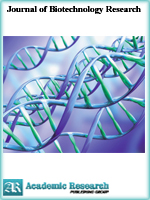Journal of Biotechnology Research
Online ISSN: 2413-3256
Print ISSN: 2413-8878
Print ISSN: 2413-8878
Quarterly Published (4 Issues Per Year)

Archives
Volume 6 Number 3 March 2020
Physicochemical and Microbiological Assessment of Drinking Water in Kari Estate Bauchi Nigeria
Authors: Muhammad M Abubakar ; Ibrahim Khalil Abubakar
Pages: 12-17
DOI: doi.org/10.32861/jbr.63.12.17
Abstract
Some sources of drinking water in Kari Estate in Bauchi Metropolis were analyzed for physicochemical contents and coliform contamination. A total of five samples were collected from different sources as follows: 2 sachets water, 2 wells, and tap water. The physicochemical analysis included the determinations of temperature, pH, electrical conductivity, total dissolved solids, turbidity, colour, suspended solids, odour, taste, total hardness, iron, nitrate, nitirite, manganese, ammonia, fluoride and cyanide. The two wells had total coliforms of 6 and 10 and faecal coliforms of 4 and 5 respectively. Tap water had total and faecal coliforms of 7 and 3 respectively. E. coli were identified in the samples from wells while Bacillus sp. were found in the tap water. Although the physicochemical contents of the samples were normal range, coliform counts of the wells and tap water were above those set by the Nigerian Industrial Standards (NIS) and the World Health Organization (WHO) standards. Presence coliforms above the standards indicates contamination and that the water may be unsafe for drinking. The presence of E. coli suggests that improvement in monitoring and water hygiene practices should be employed to improve the drinking water quality.



